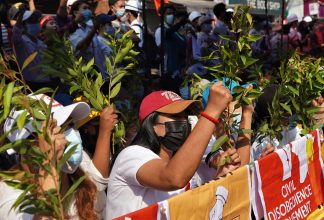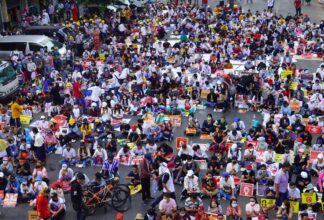The EU Must Maintain Pressure on Burma
On 22 April, the EU will review its suspended sanctions on Burma. A permanent lifting of sanctions is premature, says Civil Rights Defenders and the Swedish Burma Committee. The two organisations urge the EU to take the negotiations seriously and genuinely engage in democratic development in Burma.
“International actors agree that dialogue with Burma is preferable to isolation”, says Brittis Edman, Programme Director for Southeast Asia at Civil Rights Defenders. “In this dialogue, the EU must make very clear that the world does not turn a blind eye to serious violations of human rights. The EU should agree on a careful balance between rewards and pressure in their position on Burma.”
In April 2012 the EU suspended all sanctions on Burma with the exception of an arms embargo, as a response to the reforms that the Burmese government has undertaken. In order to permanently lift sanction, the EU also expected Burma to meet a number of benchmarks.
When EU foreign ministers now meet to renegotiate, it appears as if the decision to lift sanctions has already been taken with no consideration of the lack of progress towards meeting all benchmarks. In April 2012, the EU expected that the status of the Rohingya be addressed and their welfare improved. Since then, we have seen widespread violence in western Burma and continued persecution of the Rohingya. During the past year, hundreds of people have been killed and more than a hundred thousand Rohingya live in internally displaced people’s (IDP) camps.
According to reports authorities at both central and state level have imposed restrictions on humanitarian access to these camps and the humanitarian crisis in Rakhine State continues to escalate. The EU Council conclusions in April 2012 also called for an end to Burma’s conflicts. In Kachin State however, the war intensified at the turn of the year. The Burma Army has used airstrikes against civilian targets, and there have been reports of killings, torture and the use of sexual violence against civilians. Reports also show the blocking of humanitarian access to IDP camps where more than 75 000 people seek shelter from fighting between the Burma Army and the Kachin Independence Army.
“To lift sanctions under the current circumstances would be irresponsible of the EU”, says Jerker Ekvall, chairman of the Swedish Burma Committee. “Disregarding their own human rights benchmarks undermines the credibility of the EU and signals to the Burmese government that they too can ignore human rights.”

